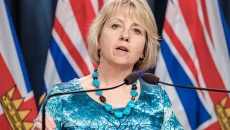A new study says quicker, more decisive action against COVID-19 in British Columbia is one of the reasons the province has suffered far fewer long-term care deaths than Ontario.
Analysis published in the Canadian Medical Association Journal also points to less funding, more privatization and less co-ordination between homes and hospitals as factors that drove spread of the novel coronavirus among Ontario's most vulnerable.
One of the paper's authors, Dr. Irfan Dhalla of St. Michael's Hospital and the University of Toronto, says there's already been a worrying rise in infections as parts of Ontario grapple with a second wave.
And despite lessons learned from the first wave of the pandemic, Dhalla says front-line workers say the province is still not adequately prepared for a new influx of long-term care cases.
"Long-term care has been somewhat neglected and somewhat underfunded across the country," Dhalla said Wednesday, nevertheless commending B.C. for acting decisively to limit cases and deaths.
"All of these factors mean that when the pandemic hit, the chances of a better outcome — or a less worse outcome — in British Columbia, were more favorable."
As of Sept. 10, Ontario reported 1,817 resident deaths from COVID-19, compared to 156 deaths in B.C. The number of cases among LTC residents in Ontario totaled nearly 6,000 compared to 466 in B.C.
The study was published Wednesday in the Canadian Medical Association Journal.
This week, Ontario Premier Doug Ford pledged more measures to rein in COVID-19 at long-term care homes, including restrictions to visitors in provincial hot-spots starting Monday.
Ford also announced $540 million to help long-term care homes support staff, pay for renovations and bolster infection control.
But the Ontario Long Term Care Association, which represents home operators, has said homes are reeling from a staffing crisis and need more support.
Dhalla says B.C.'s system entered the pandemic with several advantages, including better co-ordination between long-term care, public health and hospitals, more money for long-term care, fewer shared rooms and more comprehensive inspections.
He also credited B.C. provincial health officer Dr. Bonnie Henry with quicker action to address staffing and infection prevention and control, as well as harness public support with clear, consistent messages.
"Bonnie Henry has received worldwide acclaim for her leadership, the compassion that she demonstrates from the podium, her willingness to act decisively," says Dhalla.
In particular, he says B.C. announced in March that long-term care staff could only work in a single home, about three weeks earlier than Ontario.
Dhalla says Ontario was also a month behind B.C. in comprehensive efforts to send out infection control teams.
The paper noted other differences:
-before the pandemic, 63 per cent of Ontario residents shared a room compared to 24 per cent in British Columbia;
-in 2018–2019, the average combined funding per resident per diem was $222 in British Columbia compared to $203 in Ontario;
-58 per cent of LTC homes in Ontario are for-profit compared to 34 per cent in British Columbia;
-and some estimates suggest B.C. residents received 3.25 daily hours of direct care before the pandemic versus 2.71 daily hours in Ontario.
Dhalla acknowledges some Ontario regions and facilities did better than others because of quicker COVID response, "but that didn't happen across the province."
Dhalla also notes that the pandemic hit just as Ontario's health system was in a state of flux.
At the time, regional health networks and several provincial agencies were merged into a single agency called Ontario Health, says the paper.
That saw the departure of several senior leaders who have yet to be replaced, and came amid budget cuts for Public Health Ontario and individual public health units.





.jpg)
